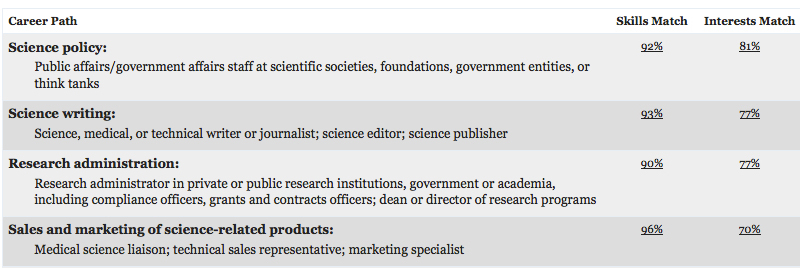myIDP (Individual Development Plan) by Science Careers
Posted by Patricia Gongal, on 21 February 2013
The myIDP (Individual Development Plan) is career aptitude test and career planning site for scientists developed by Science Careers. I recently changed careers, starting my own scientific writing company after a postdoc in developmental biology, so I was interested to see how the software worked.
The first thing you do is go through a few stages of self-assessment. First, you judge your skills in different aspects of science (ex. writing for other scientists, establishing collaborations, mentoring others). The site gives you a list of skills and abilities, and you have to enter where you are on a 1-5 scale from “highly proficient” to “highly deficient”. The software reminds you often that you’re supposed to use the full range of scores, so you have to put aside your ego and rate yourself as “highly deficient” for at least a few key skills!
Second, you rate how often you would like to do certain tasks in your future career (ex. developing and optimizing techniques, negotiating with others, working on committees).
Last, you assess your values as they relate to your career (ex. is it important to you to help advance society, use your strengths frequently in your work, have a good work/life balance). These ratings aren’t used in the career match calculation, but it’s a useful list for self-reflection just the same.
At the end of the assessment, the software tells you the percentage match between your skills and interests and different categories of scientific careers. For me, I was happy to see Science Writing come in at number two, but I was bit surprised to see Sales and Marketing at number four (a field in which I have little interest− or skills for that matter!). Having just started my own business, I was a bit dismayed to see Entrepreneurship was near the bottom!
The output of the career matching function:

The site also includes some journaling-type functions. There are places to add notes about career contacts you’ve met, list your personal career goals and map out how you plan to get there. You can set all kinds of different goals and track your progress, such as for improving some of the skills from their checklist, setting milestones to advance your career, or establishing other career-related project goals, like teaching a class or writing a paper.
At the end you can print out everything you’ve entered, all the self-assessment and goals, as a “personal development plan”.
What I found more useful than the goal-setting and career-matching functions was simply the list of diverse scientific careers, many of which I’d never thought about before. The site has a resources section for each career category that gives links to further reading. For science writing and editing, this collection of links and articles hidden on the Science Careers website was really useful.


 (4 votes)
(4 votes)